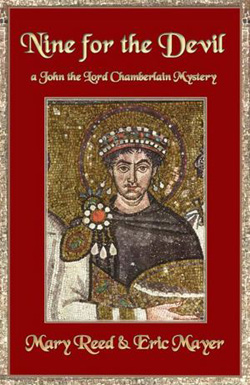 Nine for the Devil by Mary Reed and Eric Mayer is a historical mystery set in the Byzantine Empire featuring John the Lord Chamberlain (available March 6, 2012).
Nine for the Devil by Mary Reed and Eric Mayer is a historical mystery set in the Byzantine Empire featuring John the Lord Chamberlain (available March 6, 2012).
One of the reasons I love writing previews is that I get to check out so many different series. Nine for the Devil is the first novel I’ve read by the husband and wife team of Mary Reed and Eric Mayer, and the first mystery novel I’ve ever read that’s set in the sixth century.
Set in Constantinople, the series detective is Lord Chamberlain to the Emperor Justinian. He’s a character whose description immediately intrigued me, as I particularly like characters who are out of place in their milieu.
John the Eunuch, as many called him but never to his face, was in his early fifties, a tall, lean Greek, clean-shaven, with high, sharp cheekbones and sun-darkened skin. Age had not grayed his closely cropped black hair. He wore deep blue robes made of the finest cloth, adorned only by a narrow gold stripe along the hem. Dressed less elegantly, he could have passed for the mercenary he had been as a young man or as a desert-dwelling hermit.
…“Offer a prayer for her soul, John.” This was an order John could not carry out because he worshiped Mithra in secret rather than the god of the Christians.
… He had not reached twenty-five when he blundered into Persian territory, was captured, castrated, and sold into slavery like a beast.
He’s the first eunuch detective I’ve ever encountered, as well as the first Mithras-worshipper. Because he is living in a world in which Christians are a majority, and because of his castration, John operates outside of society, and is somewhat of a loner, though not quite as extreme as, for instance, Philip Marlowe. Even in the distant past, the detective stands alone.
John’s different religion offers him his own moral perspective on the crimes he investigates, which will often clash with those of the majority. Another isolating factor is the fact of how his castration happened. Unlike the usual eunuchs of the time, who were castrated at a young age before serving in the palace, his injury was an act of war when he was already an adult. For that reason, he is separate from the only others who suffered the same misfortune, and is shown to feel scorn for them. He feels his separation from society keenly.
“What a funny rhyme for you to carry around in your head, here in the capital so far from its home. It seems out of place.”
“Like the head it is carried in,” John said. A secret Mithran serving a Christian emperor, the son of a Greek farmer, former mercenary, former slave, a man who had traversed the empire from Bretania to Egypt and Persia. He had spent almost three decades in Constantinople. He carried a map of the city in his mind. He knew the most intimate details of the imperial court and its intrigues. Even so, he did not feel he belonged.
This particular novel begins with the death of the Empress Theodora. The Emperor Justinian calls upon John before the funeral.
“…I am ordering you to find her murderer. You are an eminently reasonable man, John. When you uncover evidence that she was murdered you will change your view.” John tried not to show his dismay. During Theodora’s illness no one had so much as hinted there might be anything except natural causes involved.
John’s investigation of the case is first made difficult because he lacks modern forensics. For instance, when he examines an array of bottles from the dead empress’ room, they have all been washed already. His investigation is also complicated by the fact that if he fails to find an answer to satisfy Justinian, he is at risk as well as his beloved wife and daughter, and his daughter’s unborn child. Justinian’s ruthlessness is established early when he tells John that he had all of the men who’d guarded Theodora’s sickroom killed, on the offchance they had failed in their duty. This Byzantine world is not all glorious gilding, it’s dangerous and rife with intrigue.
Reed and Mayer seem to specialize in unusual settings. I’m now curious enough to also check out their Inspector Dorj series, set in contemporary Mongolia.
Victoria Janssen is the author of three novels and numerous short stories. Her latest novel is The Duke and The Pirate Queen from Harlequin Spice. Follow her on Twitter: @victoriajanssen or find out more at victoriajanssen.com.
See all of Victoria Janssen’s posts at Criminal Element.
